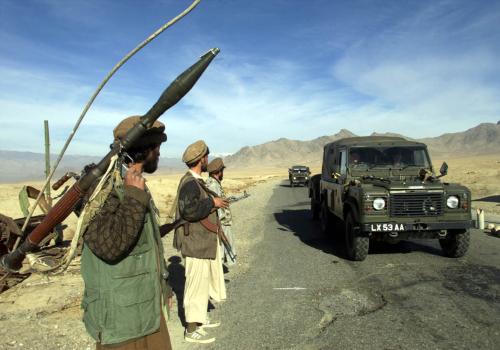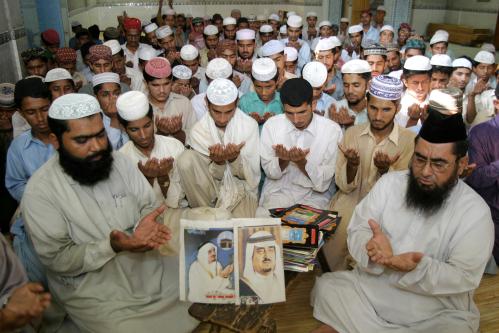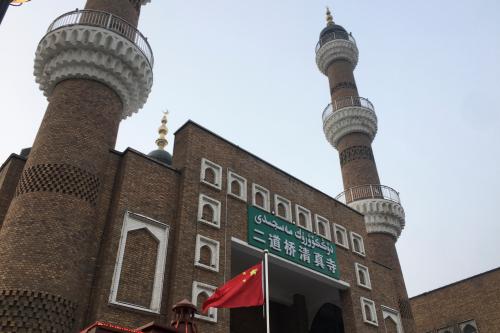

6:00 pm EDT - 8:00 pm EDT
Past Event
Content from the Brookings Doha Center is now archived. In September 2021, after 14 years of impactful partnership, Brookings and the Brookings Doha Center announced that they were ending their affiliation. The Brookings Doha Center is now the Middle East Council on Global Affairs, a separate public policy institution based in Qatar.
On March 18, 2009, the Brookings Doha Center hosted a policy discussion titled “Pakistan’s Madrassahs and Extremism: Is there a Connection?” The intellectual foundation for the discussion was a recently-published book by the first Brookings Doha Center Visiting Fellow Saleem H. Ali entitled Islam and Education: Conflict and Conformity in Pakistan. The discussion focused on Pakistani madrassahs and what links these Islamic educational institutions may or may not have to the rise of militancy in the region. Robert Wirsing, a visiting professor of South Asian politics and diplomacy of natural resources at the Georgetown School of Foreign Service in Qatar, also offered his thoughts on the role of these schools and the current situation in Pakistan in general. The talk focused primarily on the key findings of Ali’s research and the resulting policy implications. Hady Amr, director of the Brookings Doha Center and Saban Center fellow, moderated the discussion.
Ali opened by giving some background on his research, which he considered more of a “personal journey” than a natural continuation of his previous study and work in environmental planning. Ali spoke of attending Aitchison College, a prestigious high school in Pakistan founded by the British. Among his classmates was Ahmed Omar Saeed Sheikh, a man now well-known for his involvement in various acts of terrorism, including the abduction and murder of journalist Daniel Pearl. The example of this young man who grew up to be a militant for fundamentalist Islamic organizations despite being a product of western education compelled Ali to undertake this project on madrassahs, religious schools which have been declared by some to be breeding grounds for this kind of fundamentalism.
For his book, Ali conducted extensive surveys of a wide variety of madrassahs in Pakistan, both in urban and rural areas. His findings revealed that madrassahs are in fact related to sectarian violence within Pakistan but that few madrassahs could be linked to incidents of international terrorism. Ali ultimately came to the conclusion that the educational system in madrassahs does need to be reformed on the premise that the 200-year-old curriculum prepares the students to be good seminarians, but does not give them the skills necessary for other vital professions they may wish to pursue. Ali pointed however, that this change must come from within the madrassah system because any change imposed from the outside will only be resisted.
Wirsing commended Ali’s work on this subject as thorough, saying that studies on this topic must be put to scrutiny. He mentioned President Obama’s current inter-agency review of policy towards Pakistan and Afghanistan and stated that madrassahs are one important element of whatever policy is eventually developed. Wirsing also discussed his view that the term “extremism” is not a useful one in discussions as not all actions in Pakistan are based on religious motivation and using that particular word gives a lot of weight to religious identity and ignores other contributing factors to regional conflict, such as the foreign presence in the country. Moreover, sometimes actions that are labeled as “extreme” are a response to severe collateral damage and are thus understandable.
Following the remarks of the two speakers was a lively and comprehensive question and answer session. Hady Amr asked the first question, inquiring what specific policy recommendations the speakers would offer the new administration, prompting Ali to reiterate his suggestion that madrassahs must be encouraged to alter their curricula. He also stressed that the Obama administration would do well to focus more on diplomatic efforts in Pakistan, rather than military ones. Wirsing said that a real concern is the state of Pakistani public education in general. He also urged U.S. policy makers to treat Afghanistan and Pakistan as separate countries with separate issues instead of lumping them together as “Afpak.”
Following on the issue of Islamic education, another topic raised was the kind of Islamic law that should be implemented in Pakistan in order to avoid sectarian violence and prolonged conflicts. In this regard, Ali said that while the identity of Pakistan as an Islamic state is not contestable, a national dialogue should be held to determine how Islamic sharia will intertwine with political and public life in Pakistan.

Daniel L. Byman, Tricia Bacon
January 14, 2021

Bruce Riedel
May 1, 2020

Sheena Chestnut Greitens, Myunghee Lee, Emir Yazici
March 4, 2020